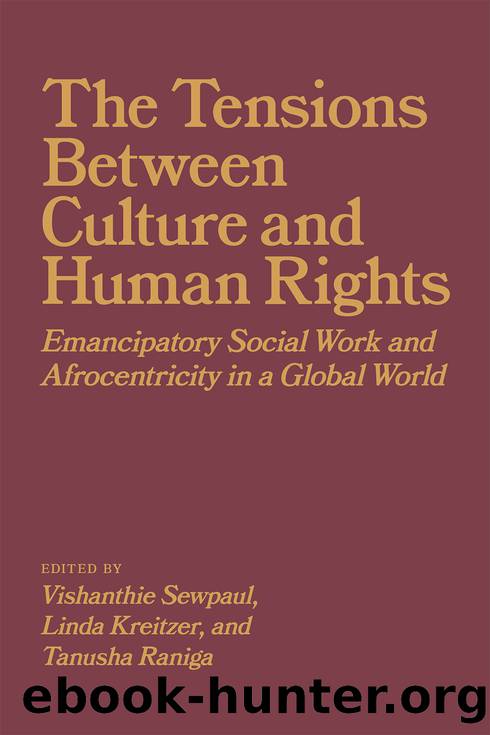The Tensions Between Culture and Human Rights by Sewpaul Vishanthie;Kreitzer Linda;Raniga Tanusha;

Author:Sewpaul, Vishanthie;Kreitzer, Linda;Raniga, Tanusha;
Language: eng
Format: epub
Tags: social work;Africa
ISBN: 9781773851860
Publisher: University of Calgary Press
Published: 2021-05-03T21:17:44+00:00
Conclusions
The accounts of women in this study underscore the link between the private domain (home) and public domain (community, state). Despite the enormous challenges to patriarchy that have occurred over the last few decades and the strides womenâs movements have made at the public level in advancing gender equality in South Africa (Vetten & Ratele, 2013), little has changed in the lives of many survivors of abuse in the private domain. These patriarchal attitudes continue to support a historically âmachoâ masculinity that encourages abuse, as highlighted in the narratives of the women interviewed.
Womenâs narratives of abuse indicate clearly why they do not readily claim these rights to protect themselves from violence in the home. The way in which men exert power and control over women in abusive relationships threatens the constitutional rights of women, including their right to dignity, equality, bodily integrity, and freedom of expression, association, and movement, as well as the right to be free from all forms of violence from either public or private sources (Government of South Africa, 1996). Until patriarchy is challenged at the root, that is, within the private sphere, public policy and political gains will have a limited impact on the lives of abused women.
These womenâs stories lead to a questioning of the utility of rights in situations of domestic violence where these are perceived to be âpaper rights.â A major gap exists between rights discourses as embedded in the Constitution and the lived experiences of abused women in the private domain. With abused women being restricted and oppressed in the private realm, the possibilities of them exercising the constitutional rights afforded to them in the public domain, through policy and legislation, is severely compromised. However, while rights in and of themselves are not adequate to change the culture that perpetuates woman abuse, they provide the basis for change. Rights serve to give women a voice in the face of the denial of their humanity and provide some way of supporting those who can find creative ways to claim these rights, in conjunction with womenâs rights organizations that support them. The question must be posed in the South African context as to whether there is adequate commitment to giving effect to these rights, since funding of human and womenâs rights organizations is dwindling; policy bureaus that were set up to monitor and evaluate womenâs rights have become less effective, and the strength and role of the womenâs movement is in question.
More work needs to be done to encourage family, friends, and neighbours who find out about woman abuse to help survivors navigate their way out of the abusive relationships. Family and friends are located in the private domain, and instead of privatizing abuse, they need to act in ways that condemn the abuse and assist women with accessing appropriate services. Further, legislative frameworks require better implementation mechanisms that account for the real danger and challenges women face when trying to leave, which contributes to their ambivalence and reluctance to report abuse. In addition,
Download
This site does not store any files on its server. We only index and link to content provided by other sites. Please contact the content providers to delete copyright contents if any and email us, we'll remove relevant links or contents immediately.
Cecilia; Or, Memoirs of an Heiress — Volume 1 by Fanny Burney(32546)
Cecilia; Or, Memoirs of an Heiress — Volume 2 by Fanny Burney(31944)
Cecilia; Or, Memoirs of an Heiress — Volume 3 by Fanny Burney(31929)
The Great Music City by Andrea Baker(31916)
We're Going to Need More Wine by Gabrielle Union(19034)
All the Missing Girls by Megan Miranda(15956)
Pimp by Iceberg Slim(14488)
Bombshells: Glamour Girls of a Lifetime by Sullivan Steve(14057)
For the Love of Europe by Rick Steves(13908)
Norse Mythology by Gaiman Neil(13348)
Talking to Strangers by Malcolm Gladwell(13347)
Fifty Shades Freed by E L James(13232)
Mindhunter: Inside the FBI's Elite Serial Crime Unit by John E. Douglas & Mark Olshaker(9321)
Crazy Rich Asians by Kevin Kwan(9277)
The Lost Art of Listening by Michael P. Nichols(7494)
Enlightenment Now: The Case for Reason, Science, Humanism, and Progress by Steven Pinker(7306)
The Four Agreements by Don Miguel Ruiz(6744)
Bad Blood by John Carreyrou(6611)
Weapons of Math Destruction by Cathy O'Neil(6264)
